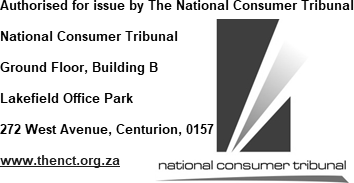IN THE NATIONAL CONSUMER TRIBUNAL HELD IN CENTURION
Case number: NCT/220990/2022/75(1)(b)
In the matter between:
TATUM SHEPHERD APPLICANT
And
CLAREMONT HOLDINGS (PTY) LTD RESPONDENT
Coram:
Adv C Sassman - Presiding Tribunal Member
Prof K Moodaliyar - Tribunal Member
Mr CJ Ntsoane - Tribunal Member
Date of Hearing - 23 November 2022 Date of Judgment - 06 December 2022

JUDGEMENT AND REASONS

PARTIES
1. The Applicant is Tatum Shepherd, an adult female consumer. At the hearing, the Applicant represented herself.
2. The Respondent is Claremont Holdings (Pty) Ltd trading as Volkswagen Claremont, a company duly incorporated and registered in terms of the company laws of the Republic of South Africa.
3. At the hearing, the Respondent was represented by Ms. Rene Blom, a legal advisor employed by the Respondent.
3. Mr. Shawn Peach, the dealership principal, testified on behalf of the Respondent.
APPLICATION TYPE
4. This application is referred to the Tribunal in terms of Section 75(1)(b) of the Consumer Protection Act, 2008 (“the CPA”). That section provides that if the National Consumer Commission (“the NCC”) issues a notice of non-referral in response to a complaint, other than on the grounds contemplated in section 116, the complainant concerned may refer the matter directly to the Tribunal, with leave of the Tribunal.
5. The Applicant obtained leave of the Tribunal. Consequently, the Tribunal has jurisdiction to hear this application.
ISSUES TO BE DECIDED
6. The Tribunal must decide whether the Respondent engaged in prohibited conduct by selling a defective vehicle to the Applicant in contravention of section 55 of the CPA and if so, whether to grant the relief the Applicant seeks. Section 55 concerns the consumer’s rights to safe, good quality goods.
7. The Respondent opposes the application.
BACKGROUND
8. On or about 16 April 2021, the Applicant purchased a VW Polo TSI DSG 1.2 Highline 2018 model motor vehicle (“the vehicle”) from the Respondent.
9. On or before 15 May 2021, a month after the purchase of the vehicle, the Applicant noticed a leak on the front passenger floor of the vehicle.
10. On 17 May 2021, the vehicle was referred to the Respondent for repairs. The Respondent could not detect the leak and subsequently returned the vehicle to the Applicant.
11. The Applicant complained to the Motor Industry Ombudsman of South Africa (“MIOSA”) and subsequently to the NCC. She received a notice of non-referral from the NCC.
12. The Respondent submitted that if the leak was detected, the vehicle was under factory warranty, and therefore, the warranty would be invoked.
13. The parties entered into a settlement agreement wherein the Respondent agreed to buy the vehicle back from the Applicant and settle the balance owed to the bank. The Respondent subsequently sold the vehicle to a new owner, who never complained about the leak.
ANALYSIS
14. The crisp question the Tribunal must decide is whether the Respondent sold the vehicle to the Applicant with an oil leak, and if so whether the leak amounted to a material defect entitling the Applicant to a refund.
15. The evidence before the Tribunal is that the Applicant entered into a purchase and sale agreement for the vehicle with the Respondent and a credit agreement with the Motor Finance Corporation, which is a division of Nedbank, to finance the purchase price of the vehicle.
16. Section 5 (2) (d) of the CPA provides that the CPA does not apply to a transaction that constitutes a credit agreement under the National Credit Act, 2005 but the CPA does not exclude goods or services subject to credit agreements from its application.
17. T pain he Tribunal is not empowered to order the Respondent to refund the Applicant any portion of the instalments the Applicant paid towards the vehicle when she had possession of it.
18. The Respondent had to ensure the consumer receives safe goods of good quality and free of defects. Similarly, the obligation to effect repairs at the request of the consumer rests on the Respondent as the supplier of the goods.
19. In terms of Section 53(1)(a) of the CPA a defect is defined as:
“(i) any material imperfection in the manufacture of the goods or components or in preference of the services, which renders the goods or result of the service less accepted able than persons would be entitled to expect in the circumstances; or
(ii) any characteristic of the goods or components that renders the goods or components less useful, practicable or safe than persons would be entitled to expect in the circumstances.”
20. In the Tribunal’s view, the evidence reveals that the vehicle had no material defects as outlined in section 53(1)(a) of the CPA. The Applicant returned the vehicle to the Respondent to detect a leak that was ultimately never detected. If the Respondent had detected the leak, then the Tribunal has no reason to gainsay the Respondent’s evidence that the leak would have been repaired under the warranty in place at the time.
21. Moreover, the MIOSA recommended that the Applicant have the vehicle assessed by an independent assessor or another VW agent. However, the Applicant never obtained the independent assessment which would have assisted the Applicant to discharge the onus borne by her that the leak existed and amounted to a material effect. The Applicant’s failure to do so is fatal to her case.
CONCLUSION
22. The Applicant has failed to show that there was a leak amounting to a material defect and that the Respondent contravened the CPA.
ORDER
23. Accordingly, the Tribunal makes the following order:
23.1. the application is dismissed; and
23.2. there is no costs order.
DATED AT CENTURION ON 6 DECEMBER 2022.
Mr. CJ Ntsoane Tribunal Member
Adv C Sassman (Presiding Tribunal Member) and Prof K Moodaliyar (Tribunal Member) concur.

